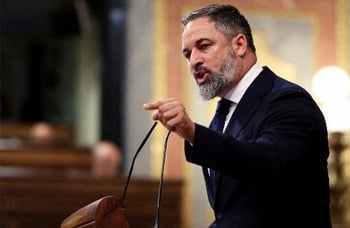-
 August 13, 2025By Junno Arocho Esteves, OSV News(OSV News) -- The Spanish bishops' conference was criticized by the head of Spain's far-right VOX party after the church expressed religious concerns following a local council's measure that would effectively ban Muslims from holding religious events in certain areas.
August 13, 2025By Junno Arocho Esteves, OSV News(OSV News) -- The Spanish bishops' conference was criticized by the head of Spain's far-right VOX party after the church expressed religious concerns following a local council's measure that would effectively ban Muslims from holding religious events in certain areas.
The country's bishops issued a statement Aug. 7 denouncing the decision by the City Council of Jumilla, located in the southern region of Murcia, to prohibit religious gatherings in sports centers, which in recent years had been used by Muslim residents to mark the celebrations of Eid al-Fitr and Eid al-Adha.
Religious demonstrations and freedom of worship, the bishops said, are protected by the Spanish Constitution as rights of religious freedom and must be respected.
"Limiting these rights violates the fundamental rights of every human being, and it affects not just one religious group but all religious denominations, as well as non-believers," the bishops said. "Imposing these restrictions on religious grounds constitutes discrimination that cannot exist in democratic societies."
In an Aug. 10 interview with Spanish YouTube channel Bipartidismo Stream, Santiago Abascal, VOX president, pushed back against the bishops' statement, saying he was "perplexed and saddened by a portion of the ecclesiastical hierarchy" and its stance on "migration or Islamic extremism," and other cultural issues.
"I don't know if it's due to the public funds the church receives, which makes it difficult for them to fight certain government policies," Abascal said. "I don't know if this weakness or silence is due to the income received as a result of the system of aid to illegal immigration, where, if you'll pardon me, not all the money goes to these supposedly needy people, but also to property maintenance."
He also suggested that the sexual abuse crisis has "absolutely gagged" the Catholic Church in the country when it came to speaking out on government actions that "go against our identity, even against religious freedom, and against the faith, in many cases."
According to The Associated Press, the measure seemingly stemmed from growing tensions in the Murcia region involving immigration, which reached a fever pitch after several residents believed to be of Moroccan origin recently attacked an elderly man.
The measure -- to ban religious gatherings in municipal sports centers -- was proposed by VOX and passed by Jumilla's City Council members, the majority of whom belong to the center-right Partido Popular party.
The measure prohibits the use of city sports facilities for "cultural, social or religious activities unrelated to the City Council." The town's mayor, Seve González, defended the decision and denied the measure was specifically targeting Muslims.
"Everything has been taken out of context. We have not prohibited anyone from praying," she said in an interview with the Spanish newspaper El País.
González told El País that the council had added an amendment to the measure proposed by VOX to counter proposals that had violated the Spanish Constitution and the Universal Declaration of Human Rights. Nevertheless, she defended the measure, saying that prohibition was meant to specifically "regulate the use of sports facilities" and that "any municipal public space is available to anyone who requests it."
"We haven't banned anything. Those headlines look great, but all they do is raise walls," she said.
The decision drew condemnation from Spain's left-leaning government, which ordered the town to drop the ban. The Islamic Commission of Spain, which represents the country's estimated 2.5 million Muslims, said in an Aug. 9 statement that the ban represented a "worrying deterioration of the democracy and pluralistic coexistence that characterizes our country."
"We appreciate the expressions of solidarity received from representative institutions of other faiths, such as the (Spanish) Bishops' Conference and the Federation of Jewish Communities of Spain, and we reiterate our commitment to dialogue, cooperation, and the defense of an inclusive Spain, where all people, regardless of their faith, can freely exercise their beliefs within a framework of mutual respect," the commission said.
